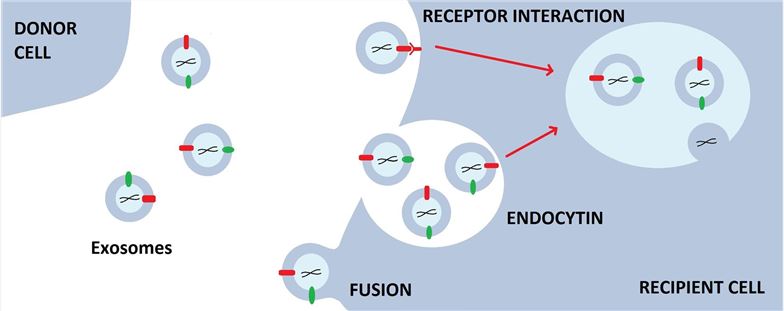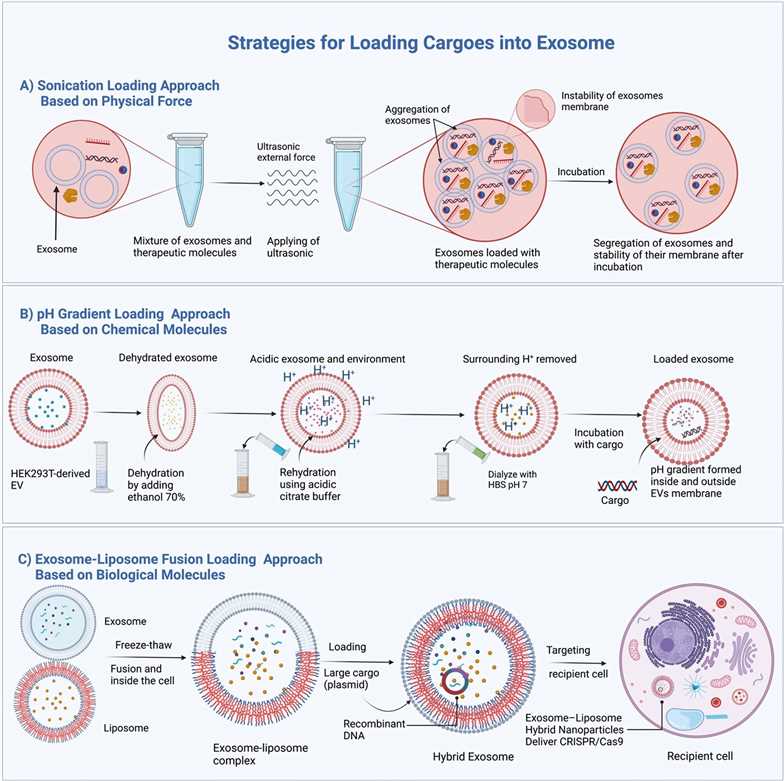Therapeutic Applications of Exosomes
With years of hard working in exosome technology and engineering, Creative Biolabs has got all the necessary knowledge and technologies of exosomes. We give an introduction of the therapeutic applications of exosomes in diseases and approaches utilized for drug loading into exosomes.
Exosomes are cell-derived vesicles that are presented in many and perhaps all eukaryotic fluids, including blood, urine, and cultured medium of cell cultures. They have the common features like liposomes with a phospholipid bilayer and being composed of biocompatible substances. Besides, exosomes have endogenously synthesized lipid, protein, and RNA. In view of these characteristics, exosomes are useful drug delivery tools that have multiple advantages over conventional delivery systems. Drugs delivered by exosomes may be efficiently absorbed by target tissues and cells with high specificity and lack of immunologic reactions. Thus, exosomes function as a popular tool to deliver multiple drugs to various target tissues.
Exosomes loading with drugs have been widely used for various diseases treatment. In a research, exosomes containing the anti-inflammatory small molecule compound curcumin have been shown to protect mice from brain inflammation induced by lipopolysaccharides. The incorporation of curcumin in exosomes improved its solubility, prolonged circulation time, retained drug therapy activity, and improved brain delivery. During tumor treatment, tumor exosomes loaded with anti-tumor drugs can effectively ensure drug maintain their native property and promote drug transport to target tumor tissue. For example, exosomes carrying different chemotherapeutics, PTX or Dox, have been shown to transport to tumor tissues and decrease tumor growth in mice without the adverse effects with the equipotent free drug. Furthermore, exosomes also act as exogenous siRNA carrier, which is used for cancer treatment. A study showed that exosomes loaded with siRNA against RAD51 caused massive reproductive cell death of recipient cancer cells. In addition, a biocompatible platform based on blood exosomes for delivering drugs across the blood-brain barrier has been developed. Dopamine can be successfully loaded into blood exosomes and then transport into brain, including the striatum and substantia nigra. The distribution of dopamine in brain increased more than 15 times by using the blood exosomes as delivery system. Hence, blood exosomes loaded with dopamine are effective strategies for Parkinson’s disease (PD) treatment.
 Fig.1 Exosome uptake.1,3
Fig.1 Exosome uptake.1,3
There have several distinct approaches that are used for the encapsulate therapeutic cargo with exosomal carriers. The selection of methods depends on the type of therapeutic agents, site of the disease, and conditions suitable for a specific type of exosome-loaded cargo.
-
Most lipophilic small molecules are passively loaded into exosomes during co-incubation with purified exosomes or exosome-like vesicles, such as low molecular antioxidant and anticancer agents.
-
Parental cells are loaded with a therapeutic agent, which then are released in exosomes.
-
Transfecting/infecting parental cells with drug-encoding DNA which are then released in exosomes.
 Fig.2 Loading exosomes with cargos based on physical, chemical, and biological techniques.2,3
Fig.2 Loading exosomes with cargos based on physical, chemical, and biological techniques.2,3
Features of Our Services
-
Extentive experienced in exosome engineering
-
Advanced technique platform
-
Whole-process technical guidance
-
High-quality and low cost services
We are confident to offer a series of exosome-related services including drug loading into exosomes and exosome genetical modification. If you are interested in our services, please feel free to contact us for more information.
References
-
Bunggulawa, EJ.; et al. Recent advancements in the use of exosomes as drug delivery systems. Journal of Nanobiotechnology. 2018, 16(1):81.
-
Hussen, BM.; et al. Strategies to overcome the main challenges of the use of exosomes as drug carrier for cancer therapy. Cancer Cell International. 2022, 22(1):323
-
under Open Access license CC BY 4.0, without modification.
For Research Use Only. Cannot be used by patients.
Related Services:

 Fig.1 Exosome uptake.1,3
Fig.1 Exosome uptake.1,3
 Fig.2 Loading exosomes with cargos based on physical, chemical, and biological techniques.2,3
Fig.2 Loading exosomes with cargos based on physical, chemical, and biological techniques.2,3









